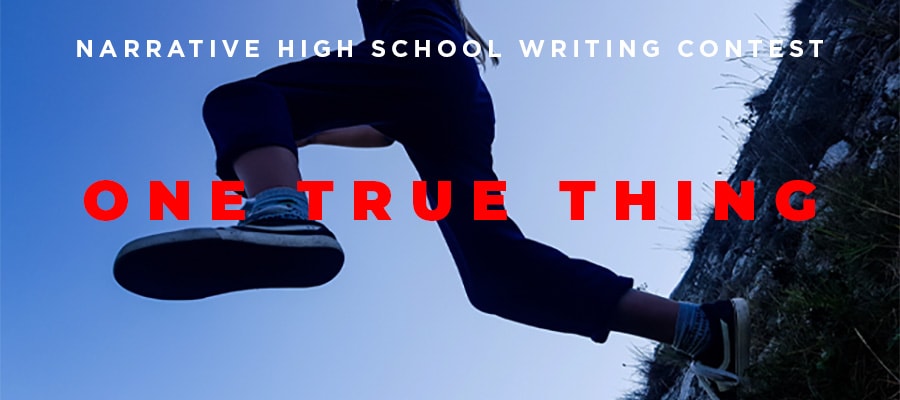2025–2026 NARRATIVE HIGH SCHOOL WRITING CONTEST GUIDELINES
The Eleventh Annual Narrative High School Writing Contest
submission portal is now closed. We look forward to announcing this year's winners and finalists on April 15, 2026.
Submissions to our contest cover the globe: indeed, we have heard from young writers across the US and in fifty-five countries, from Canada to Malaysia, Serbia to Spain, South Korea to South Africa, and Pakistan to Peru—an amazing outpouring of new writing. Congratulations to all the students and teachers who’ve participated in contests from years past. Your work and passion continue to inspire and amaze us!
Who can enter the annual contest?
Students from the US and internationally, grades 9–12, are eligible to submit to the contest through their teachers. Winners and finalists will be asked to provide identification.
What was this year’s prompt?
Here’s a note from our judge, Narrative cofounder/editor and bestselling author, Carol Edgarian:
Dear Writers,
If you were asked to name one true thing in your life, what would it be? If you wanted to tell someone the story of how you came to know that one true thing, how would the story go?
Using the prompt “One True Thing” as a springboard, we invite you to write a story, essay, or poem that takes your reader on a journey toward at least one crystalized moment of truth. Go to the places that are vulnerable, messy, authentic, and provide your reader with a moment of earned recognition. Write about what confuses or shocks or angers you, ask who you are and what you’re capable of, talk of things you might not think you have the agency to change or fix—and from this messy mix that is life, show us something that is true. It can be truth held by only one character or two; it can be a new awareness that is still raw or unguarded—all that is rich turf for writing. Create the space, conjure the world, use your authentic voice to take us on a journey toward something/someone or even a moment that you experience as true.
Be artful, be original. Be bold! Pick a subject or issue that confounds the world at large or troubles your life specifically—it can be something outside your window, your country, or closest of all, something in your heart. Write a story or essay of no more than 600 words, or a poem of 10 to 50 lines, that touches on this theme of truth. A messy world provides writers with ample opportunity to speak of truth. Be that writer!
You may turn toward the metaphorical or the literal, the small or the large, the individual or the systemic. Lean into the question, and ask others to join you. We each have something to learn and something to teach. We challenge you not to dwell too much on what is wrong but instead to turn challenges into what you want and what you love. Take us on a journey that is distinctly your own, and shows us what we’re missing. I cannot wait to read what only you can write!
—Carol Edgarian
How will the winners be chosen, and when will they be announced?
For fairness, all judging of submitted work will be done with names, grades, and school affiliations removed and, further, entries will be sorted randomly by
Narrative’s team—led by
Narrative cofounder/editor and New York Times–bestselling author Carol Edgarian. A first-, second-, and third-place winner, along with the contest finalists, will be announced in mid-April. Carol Edgarian will meet to mentor the winning writers and edit their pieces over Zoom prior to publication.
What awards will the winners receive?
Cash and prizes totaling more than $3,000 will be awarded. The winning author will be presented with a $500 award. The second-place winner will receive $250, and the third-place winner will receive $100. Each finalist will receive $50. The schools of the winners and finalists will also receive special recognition and prizes. The winning works will be published in Narrative, alongside many of today’s great writers.
Here's a short video featuring the winners of our Seventh Annual Contest, along with guest judge Jericho Brown and Narrative editor Carol Edgarian as they share their thoughts on inspiration and writing.
Winning pieces in the Narrative High School Writing Contest:
The Sixth Annual High School Contest: Escape
I have a question!
If there’s something we haven’t covered, feel free to reach out to us at
@email. We love to hear from students and teachers!




